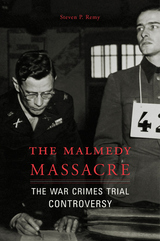
In the first work to examine both nazification and denazification of a major German university, Steven Remy offers a sobering account of the German academic community from 1933 to 1957. Deeply researched in university archives, newly opened denazification records, occupation reports, and contemporary publications, The Heidelberg Myth starkly details how extensively the university's professors were engaged with National Socialism and how effectively they frustrated postwar efforts to ascertain the truth.
Many scholars directly justified or implemented Nazi policies, forming a crucial element in the social consensus supporting Hitler and willingly embracing the Nazis' "German spirit," a concept encompassing aggressive nationalism, anti-Semitism, and the rejection of objectivity in scholarship. In elaborate postwar self-defense narratives, they portrayed themselves as unpolitical and uncorrupted by Nazism. This "Heidelberg myth" provided justification for widespread resistance to denazification and the restoration of compromised scholars to their positions, and set the remarkably long-lasting consensus that German academic culture had remained untainted by Nazi ideology.
The Heidelberg Myth is a valuable contribution to German social, intellectual, and political history, as well as to works on collective memory in societies emerging from dictatorship.

During the Battle of the Bulge, Waffen SS soldiers shot 84 American prisoners near the Belgian town of Malmedy—the deadliest mass execution of U.S. soldiers during World War II. The bloody deeds of December 17, 1944, produced the most controversial war crimes trial in American history. Drawing on newly declassified documents, Steven Remy revisits the massacre—and the decade-long controversy that followed—to set the record straight.
After the war, the U.S. Army tracked down 74 of the SS men involved in the massacre and other atrocities and put them on trial at Dachau. All the defendants were convicted and sentenced to death or life imprisonment. Over the following decade, however, a network of Germans and sympathetic Americans succeeded in discrediting the trial. They claimed that interrogators—some of them Jewish émigrés—had coerced false confessions and that heat of battle conditions, rather than superiors’ orders, had led to the shooting. They insisted that vengeance, not justice, was the prosecution’s true objective. The controversy generated by these accusations, leveled just as the United States was anxious to placate its West German ally, resulted in the release of all the convicted men by 1957.
The Malmedy Massacre shows that the torture accusations were untrue, and the massacre was no accident but was typical of the Waffen SS’s brutal fighting style. Remy reveals in unprecedented depth how German and American amnesty advocates warped our understanding of one of the war’s most infamous crimes through a systematic campaign of fabrications and distortions.
READERS
Browse our collection.
PUBLISHERS
See BiblioVault's publisher services.
STUDENT SERVICES
Files for college accessibility offices.
UChicago Accessibility Resources
home | accessibility | search | about | contact us
BiblioVault ® 2001 - 2024
The University of Chicago Press









